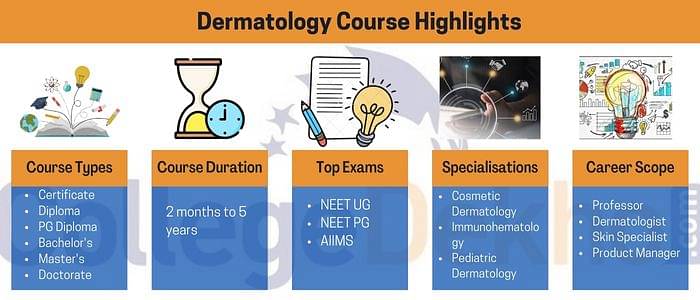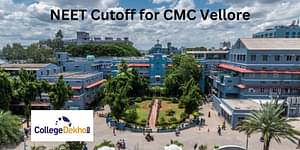Dermatology
Dermatology Courses Overview
Dermatology is a branch of science that comprises the study of skin. Aspirants can become Dermatologists by pursuing courses such as Certificate, Diploma, UG, PG, and Ph.D. They need to clear 10+2 studies in Science stream to fulfill the eligibility criteria. A physician who is trained and has specialized in the field of dermatology are known as dermatologists. During the course of the studies, students learn how to treat more than 3,000 skin conditions. Aspirants have to clear any one of the NEET, JIPMER, AIIMS, etc. entrance exams to secure admission in Dermatology courses.
The courses are offered offline as well as online. Topmost colleges such as AIIMS, SRM Institute of Technology, Jawaharlal Institute of PostGraduate Medical Education And Research, Mahatma Gandhi Institute of Medical Sciences, etc. offer admission in dermatology courses. The course fees range anywhere between INR 10,000 to INR 65,00,000. Once students graduate from these institutes, unlimited opportunities await them. Some of the best career paths one can explore are Dermatologist, Consultant Dermatologist, Surgical Dermatologist, Skin Specialist, and more. Candidates can refer to this page to understand in detail about Dermatology courses and career.
Table of Contents
- Dermatology Courses Overview
- Dermatology Course Highlights
- Why Choose Dermatologist Course?
- Dermatology Course Types and Specializations
- Entrance Exam for Dermatology Courses
- Eligibility Criteria for Dermatology Courses
- How to Secure Admission in Dermatology Course?
- Top Colleges for Dermatology Course
- Dermatology Course Abroad
- What is Dermatology Course Fees?
- Dermatology Courses Specializations
- Dermatology Course Syllabus
- Top 10 Dermatology Courses In India
- Books & Study Materials of Dermatology Course
- Dermatology Scope in India - Career and Job Prospects
- What is the Salary Scale for Dermatology Graduates?
- Skills Needed to Become a Dermatologist
- FAQs about Dermatology
Dermatology Course Highlights
Before diving into finer aspects of Dermatology course, candidates can refer to the table below to get a quick overview and build a basic understanding of the programme.
| Events | Specifications |
|---|---|
| Popular Courses |
|
| Eligibility |
|
| Duration |
3 months to 1 year (for Offline)
|
| Average Fees |
|
| Types of Online Courses | Skin Cancer Medicine, Dermoscopy, etc. |
| Online Courses | Available |
| Top Job Prospects | Pediatric Dermatologists, Dermatopathologists, Cosmetic Surgeons, |

Why Choose Dermatologist Course?
As a Dermatologist, you’ll witness several patients with different types of skin ailments. At such instances, professionals must share their expertise and assist the one in need correctly. Room for error is next to none - making it a highly responsible job profile. Here are some duties one must fulfill while working as a Dermatology expert.
Treats scars, hair loss, and numerous other skin-related problems
Diagnose and treat melanomas, skin cancer, moles, and skin tumors.
Perform cosmetic surgery
Teach patients about basic skin care as well as hair care routine
Analyze every patient's case thoroughly and provide the correct solution to the ailment
Dermatology Course Types and Specializations
There are several dermatology courses that candidates can choose from in order to build a bright future. Each course has its advantages. Depending on where aspirants’ ambition lie, a relevant programme can be picked. So, refer below to find out the best courses that one can opt for dermatology.
Certificate Dermatology Courses
Certificate courses are gaining popularity because of the easy access and vast content library students can access anytime and anywhere. Depending on the college of one's choice, the certificate course can be pursued online or offline. It can last anywhere between a month to a year based on how much you need to learn. Its fee ranges anywhere between INR 50 thousand to 3 Lakh. Here are some of the specializations one can explore in certificate dermatology courses:
Online Dermatology Courses
Listed below are some interesting courses candidates can explore on different online platforms.
Certificate Name |
Provider |
Fees |
Duration |
|---|---|---|---|
|
Dermatologic Pathologies |
Udemy |
INR 1,920 |
1 hour |
|
Dermatology: Trip to skin |
Coursera |
INR 2,155 |
6 Hours |
|
Certificate Course in Ayurvedic Dermatology |
Institute of E- Ayurved |
INR 10,000 |
3 Months |
|
Professional Certificate of Dermoscopy |
Healthcert |
INR 49,338/ month |
15 weeks |
Offline Dermatology Courses
Candidates who prefer learning in a physical classroom setup can explore offline certificate courses:
Certificate Name |
Average Fees |
Colleges/ Institutes Offering |
|---|---|---|
|
Dermatological Surgeries Workshop |
INR 60,000- INR 2,00,000 |
Indian Institute of Aesthetic Medicine |
|
Certificate Course in Cosmetic Dermatology |
INR 20,000 |
Indian Institute of Aesthetic Medicine |
Diploma and PG Diploma Dermatology Courses
Diploma courses are ideal for those who wish to join the workforce at an early age. The programme not only equips students with the right knowledge but also gives diploma holders a chance to work while studying.
Many colleges offer Under-graduate diploma courses of 3 years’ duration as well as Post Graduate Diploma courses of 2 years’ duration. It all depends on what choice candidates make. Diploma Courses can be pursued after one has completed 12th or 10th class studies while Post Graduate Diploma can be done after Graduation. Here are some of the specializations one can explore in this course:
Diploma Dermatology Courses
Candidates can refer to the table below to get an idea about specializations available under Diploma Dermatology courses.
Diploma Name |
Average Fees |
Top Colleges |
|---|---|---|
|
Diploma in Dermatology |
INR 15,000- INR 2,00,000 |
Dr Ram Manohar Lohia Hospital and Post Graduate Institute of Medical Education and Research |
|
Diploma in Skin and venereology and Dermatology |
INR 2,00,000- INR 4,00,000 |
BJ Government Medical College |
|
Diploma in Dermatology, Venereology and Leprosy |
INR 32,000- INR 18,00,000 |
Maulana Azad medical college, Smt NHL Municipal Medical College, Raja Mutiah Medical College |
PG Diploma Dermatology Courses
One can check out the table below to understand about specializations available under PG Diploma Dermatology course.
PG Diploma Name |
Average Fees |
Top Colleges |
|---|---|---|
|
Postgraduate diploma in Venereology and Leprosy |
INR 2,00,000- INR 10,00,000 |
MS Ramaiah Medical College, University of Delhi, Bharti Vidyapeeth, Sardar Patel University |
|
Post Graduate Diploma in Clinical Cosmetology. |
INR 55,000- INR 2,00,000 |
Guru Kashi University, Indian Institute of Aesthetic Medicine |
Bachelor Dermatology Courses
In most Bachelor of Dermatology courses, the programme lasts about 3 years. It is pursued by students who wish to embark on a bright future and gain deep knowledge on all skin-related issues. Students can opt for the below-mentioned specialization.
Courses |
Duration |
Colleges |
Average Fees |
|---|---|---|---|
|
B.Sc. Dermatology |
3 years |
AIIMS Christian Medical College |
INR 1,600- INR 10,00,000 |
Postgraduate Dermatology Courses
Securing a Master’s degree assists graduates in gaining advanced training and leadership skills. This proves vital while conducting research and supervising technological teams. Master’s course ideally lasts anywhere between 2-3 years.
Courses |
Duration |
Colleges |
Fees |
|---|---|---|---|
|
M.Sc. Dermatology |
2-5 years |
AIIMS Christian Medical College |
INR 1,600- INR 10,00,000 |
Doctorate Dermatology Courses
A Doctorate is deemed as the highest university degree that is granted to individuals after they complete the course of study and to those who wish to continue research work in a particular field. This course is the go-to option for candidates who wish to take a deep dive into a particular area of their study. To pursue a PhD in Dermatology, aspirants must possess a Master's Degree from a recognized university.
Course Name |
Colleges |
Average Fees per Year |
|---|---|---|
|
PH.D. (Dermatology) |
Jawaharlal Institute of PostGraduate Medical Education And Research SRM Institute Of Technology |
INR 3,600 INR 1,20,000 |
|
PH.D. (Dermatology & Venerology) |
AIIMS Datta Meghe Institute of Medical Sciences Annamalai University |
INR 2,000 - INR 1,20,000 |
Entrance Exam for Dermatology Courses
Candidates can refer to the section below to find out different entrance exams for Dermatology courses
Entrance Exams for Bachelor Dermatology Course
All renowned entrance exams for UG admission is listed below:
Entrance Exam |
Conducting Body |
|---|---|
|
AIIMS PG |
AIIMS |
|
NEET |
NTA |
|
JIPMER PG |
Jawaharlal Institute of Postgraduate Medical Education and Research |
Entrance Exams for Postgraduate Dermatology Course
All renowned entrance exams for PG admission is listed below:
Entrance Exam |
Conducting Body |
Mode |
|---|---|---|
|
JIPMER |
Jawaharlal Institute of Postgraduate Medical Education and Research, Puducherry |
Offline |
|
NEET |
MCI |
Offline |
|
AP EAMCET |
JNTUK |
Offline |
|
SUAT |
Sharda University |
Offline |
Entrance Exams for Doctorate Dermatology Course
All renowned entrance exams for Doctorate admission are listed below:
Entrance Exam |
Conducted By |
|---|---|
|
ICMR JRF |
ICMR |
|
GATE |
IITs |
|
UGC NET |
NTA |
|
AIIMS PG |
AIIMS |
Eligibility Criteria for Dermatology Courses
Candidates need to fulfill eligibility criteria for the Dermatology course in order to secure admission in colleges of their choice. The minimum requirement for admission varies for different courses. Here is the eligibility criteria for Dermatology courses that candidates must know.
Eligibility Criteria for Certificate Dermatology Courses
Certificate courses eligibility criteria is subjective to the platform offering the programme. Some ask students to just register and learn, others conduct a screening test to understand students' skillset and then grant admission. It all depends on where you want to learn the course.
Eligibility Criteria for Diploma and PG Diploma Dermatology Courses
The eligibility criteria differ for Diploma and PG Diploma courses. Candidates need to make sure that they check the right information to prevent any type of miscommunication.
Check below to refer to the eligibility criteria for Diploma Dermatology Course:
-
Candidates who want to pursue Diploma in Dermatology must hold an MBBS degree along with a year of internship
-
Aspirants need to complete class 10th and 12 with Physics, Biology, and Chemistry as main subjects.
-
Students need to score at least 50% marks in class 12th and in MBBS course for admissions
Here is the eligibility criteria for PG Diploma Dermatology Course:
-
Aspirants need to complete the MBBS degree or secure a provisional MBBS pass certificate as per the provisions of the NMC Act, 2019 as well as the repealed Indian Medical Council Act 1956
-
Students need to possess a provisional or permanent registration certificate of MBBS qualification that has been issued by the NMC
-
Aspirants must have completed one year of internship or at least likely to complete the internship on or before May 31, 2022
-
Students must have secured minimum 50 percentile for General category, 40 percentile for ST/SC/OBC (including PWD of ST/SC/OBC) as well as 45 percentile for UR PWD) in NEET PG exams
Eligibility Criteria for Bachelor Dermatology Courses
Those who wish to charter the path of Bachelor of Dermatology courses must fulfill these requirements:
-
Aspirants must have cleared 10+2 or equivalent with Physics, Biology/Biotechnology, Chemistry, and English as the core subjects
-
Candidates must secure the 12th passing certificate from a recognized board
-
Aspirants need to clear NEET UG exam
Eligibility Criteria for Doctorate Dermatology Courses
In order to pursue Docotare degree, candidates must meet the following eligbility criteria first:
-
Aspiramts need to possess an MBBS Degree/ PG degree from an institution known and recognized by the Medical Council of India (MCI). It must adhere to guidelines set as per Indian Medical Council Act 1956.
-
Students need to complete a 1- year compulsory rotating internship after clearing MBBS before 30th April of the same academic year.
How to Secure Admission in Dermatology Course?
Dermatology course is vast and branched across several specialties. Every degree/ certificate has its own way of providing admission. Candidates can scan through the admission process for different courses below.
Admission to Certificate Dermatology Courses
Securing admission in the certificate courses is different from bachelor’s and master’s degrees. Here there is no set structure in place. It varies from one institute to another. Most colleges don’t ask for entrance exam results. Some provide enrollment in the programme with a simple registration.
Premier institutes often analyze candidates’ profiles and conduct screening tests to see their capabilities. In case of offline certificate programs, universities might admit you on the basis of merit. Here your Class X or XII scores will be applicable.
Admission to Diploma and PG Diploma Dermatology Courses
In case of Diploma courses, candidates are provided admission based on the merit list score. The concerned college releases the cutoff on its official website or on the notice board. For Diploma courses, Class XII score is taken into consideration, and for PG diploma programmes, Graduation scores are given preference.
Admission to Bachelor Dermatology Course
Candidates have to appear for dedicated entrance examinations to secure admission in UG courses. The tests are held at the state, national, or university level. Students are shortlisted based on the merit list released by the exam conducting authorities.
Admission to Postgraduate Dermatology Courses
Just like UG courses, candidates have to appear for entrance examination in order to secure admission in Postgraduate Dermatology courses. Individuals are granted seats based on the marks obtained in the exam.
Admission to Doctorate Dermatology Courses
Most of the institutes ask candidates to clear entrance exams before offering a seat in their college. Shortlisted aspirants might be called for a personal interview round to assess their knowledge and experience
Top Colleges for Dermatology Course
Colleges allow students to gain quality education and join the future workforce. Thus, all candidates wish to study at the topmost universities. Aspirants can check out the top colleges given below for Dermatology Courses:
Best Colleges for Certificate Dermatology Courses
Here are some of the best online platforms and colleges for Certificate Dermatology Courses:
College/ Institute Name |
Mode of Learning |
Duration |
Location |
|---|---|---|---|
|
Institute of E- Ayurved |
Online |
3 months |
Amravati, Maharashtra |
|
Indian Institute of Aesthetic Medicine |
Offline |
1 Year |
Pune |
|
Healthcert |
Online |
15 weeks |
Singapore |
Best Colleges for Diploma and PG Diploma Dermatology Courses
Here are some of the best online platforms and colleges for Diploma and PG Diploma Dermatology Courses:
College Name |
Course Type |
Location |
Fees |
|---|---|---|---|
|
Diploma |
Ahmedabad |
INR 3,00,000 |
|
|
Diploma |
Delhi |
INR 32,000 |
|
|
BJ Government Medical College |
Diploma |
Pune |
INR 80,000 |
|
Dr Ram Manohar Lohia Hospital and Post Graduate Institute of Medical Education and Research |
Diploma |
Lucknow |
INR 80,000 |
|
Diploma |
Navi Mumbai |
INR 35,00,000 |
|
|
PG Diploma |
Mumbai |
INR 67,230 |
|
|
PG Diploma |
Mahbub Nagar, Telangana |
INR 3,19,725 |
|
|
Institute of Post Graduate Medical Education and Research |
PG Diploma |
Kolkata |
INR 6,000 |
|
PG Diploma |
Wardha |
INR 92,900 |
|
|
PT Bhagwat Dayal Sharma Post Graduate Institute of Medical Sciences |
PG Diploma |
Rohtak |
INR 21,153 |
Best Colleges for Bachelor Dermatology Courses
Here are some of the best online platforms and colleges for Bachelor Dermatology Courses:
Colleges |
Location |
Fees |
|---|---|---|
|
Vellore |
INR 23,280 |
|
|
Mangalore |
INR 1,75,000 |
|
|
New Delhi |
INR 1,145 |
Best Colleges for Postgraduate Dermatology Courses
Here are some of the best online platforms and colleges for Postgraduate Dermatology Courses:
Colleges |
Location |
Fees (INR) |
|---|---|---|
|
Salem, Tamil Nadu |
INR 51,000 |
|
|
Chennai |
INR 1,12,000 |
Best Colleges for Doctorate Dermatology Courses
Here are some of the best online platforms and colleges for Doctorate Dermatology Courses:
Colleges |
Location |
Fees |
|---|---|---|
|
AIIMS |
Delhi |
INR 2,045 |
|
Wardha |
INR 1,10,000 |
|
|
Kanchipuram |
INR 16,000 |
|
|
Jawaharlal Institute of PostGraduate Medical Education And Research |
Puducherry |
INR 3,600 |
|
Annamalai University |
Chidambaram, Tamil Nadu |
INR 64,400 |
Dermatology Course Abroad
Candidates who wish to gain insightful knowledge and build on their skillset can choose to pursue Dermatology abroad. They will get exposure to quality education, amazing learning infrastructure, and a new outlook on the subject. Here are top colleges offering Dermatology courses abroad:
College |
Course |
|---|---|
|
University of Sunderland |
Cosmetic Science MSc |
|
University of Miami |
M.S. in Skin Biology and Dermatological Sciences |
|
Victoria University |
Bachelor of Dermal Sciences |
|
University of Sunderland |
Cosmetic Science BSc (Hons) |
|
Cardiff University |
Clinical Dermatology |
|
Cardiff University |
Practical Dermatology |
|
Dalhousie University |
Dermatology |
|
University of Nottingham |
Dermatology (Research) |
|
University of Hertfordshire |
Clinical Skin Integrity and Wound Management |
|
Newcastle college |
Advanced Skin Techniques |
What is Dermatology Course Fees?
Dermatology course fees vary depending on which college students wish to study at. It ranges from anywhere between INR 20,000 at government colleges to INR 65,00,000 at top-ranking universities. Job opportunities unlock according to the skillset and knowledge students’ possess. Thus, based on the financial planning of the family, aspirants can aim to target colleges accordingly.
Dermatology Courses Specializations
Some of the popular specializations that are available under the dermatology course are listed below:
- Cosmetic Dermatology
- Immunodermatology
- Pediatric Dermatology
- Dermatopathology
- Teledermatology
- Mohs surgery
Dermatology Course Syllabus
The syllabus of Dermatology course is vast and covers important topics related to skin biology, cellular components, the study of DNA, Melanocytes, diseases, Photoaging, Sun-protective agents, Principles and application of phototherapy, and much more. Based on what certificate/ Degree level candidates are eligible to study, the syllabus varies.
Syllabus of Certificate Dermatology Courses
Online and offline certificate courses don’t have a standard structure. Based on which platform one opts to study, the syllabus differs. However, there are certain topics that need to be covered in a certificate Dermatology course. Here are the important concepts that one must look out for:
-
Clinical-Pathologic Correlations
-
Structure and Function of the Skin
-
Dermatopathology
-
Study of Sexually Transmitted Diseases and AIDS
-
Cutaneous Microbiology
-
Photobiology
-
Hair Loss and Diseases of the Scalp
-
Pediatric Dermatology
-
Dermatologic Surgery
Syllabus of Diploma and PG Diploma Dermatology Courses
Diploma studies are a bit easier to comprehend compared to a UG/ PG/ Doctorate degree. Check out the diploma-level syllabus of Dermatology below.
-
Skin Biology & Common Disorders
-
Skin Diseases in Childhood, Pregnancy, Adolescence & Old Age
-
Skin Systemic Disease, Hair, Nails & Oral Lesions
-
Moles, Skin Cancer, Infections & Infestations
-
Clinical Practice
The important subjects that are a part of the PG Diploma syllabus are given below:
-
Introduction, Historical aspects, and Epidemiology
-
Anatomy and organization of human skin
-
Diagnosis of skin diseases
-
Melanocytic Naevi and Malignant melanoma
-
Disorders of skin color
-
Bullous eruptions
-
The Neonate
-
Disorders of sweat glands
-
Contact dermatitis
-
Genetics and genodermatoses
-
Cutaneous vasculitis
-
Mastocytosis
-
Purpura
-
Lichen planus and Lichenoid disorders
-
Diseases of the veins and arteries including leg ulcers
-
Occupational dermatoses
-
Eczema, Lichenification, Prurigo and Erythroderma
Syllabus of Bachelor Dermatology Courses
Candidates who wish to secure an MD degree in Dermatology or pursue Doctorate must complete MBBS degree first. Students need to follow the general MBBS syllabus. Here are important topics that Dermatology students must know:
-
Structure & Function of the Skin. Terminology of skin lesions
-
Common Parasitic infections
-
Common Fungal infections
-
Common bacterial infections
-
Papulosquamous Disorders
-
Urticaria & Angioedema
-
Bullous Disorders
-
Adverse Drug Eruptions, Erythema Multiforme, SJS, TEN
-
Chancroid, Granuloma Inguinale, LGV
-
Syndromic Management of STDs
-
Leprosy –Aetiopathogenesis, Clinical Features and Diagnosis
Syllabus of Postgraduate Dermatology Courses
Aspirants seeking in-depth knowledge usually charter the path of PG Dermatology course. During their study duration, one learns the below-mentioned topics from the syllabus.
-
Clinical Dermatology
-
Allied Basic Sciences
-
Leprosy
-
Venerology
-
Viral STD including HIV, Herpes, HPV, Molluscum Contagiosum, EBV, etc.
-
Anatomy of Male & Female Genitalia
-
Epidemiology of skin disease
-
Naevi and other developmental defects
-
Eczema, Lichenification, Prurigo, and Erythroderma
-
Immunoglobulins
-
Cytokines and chemokines
-
Biology of hair follicles, sebaceous glands, and nails
-
Ultrastructural aspects of the epidermis, epidermal appendages, dermo-epidermal junction, dermis, and sub-cutis
Syllabus of Doctorate Dermatology Courses
Those who pursue Doctorate have to indulge in theoretical as well as practical studies. The degree is considered to be highly esteemed. Individuals get to learn these topics from the syllabus while pursuing the Doctorate Dermatology course.
-
Dermatology – Fundamentals, Structure and Development of skin, and Biochemistry and Physiology of the epidermis and its appendages
-
Metabolic disorders
-
Venereology
-
Allergic disorders
-
Leprosy
-
AIDS
-
Dermatopathology
-
Anatomy
-
Skin Diseases
-
Genetics and Genodermatoses
-
Dermatology in relation to internal medicine
-
Disorders of Nutrition and Metabolism
-
Nutritional diseases – protein and vitamin deficiencies
-
Pigmentary Disorders
Top 10 Dermatology Courses In India
Candidates can opt for dermatology courses after they have completed their higher secondary education. There are several online and offline platforms that provide students with proper dermatology course certificates within a period of 6 months to 1 year. Many educational institutions also provide students with a certification or diploma degree in dermatology courses in online mode. Here are the top 10 dermatology courses in India that are popular among the candidates:
Course | Average Fee |
|---|---|
Post Graduate Diploma in Clinical Cosmetology | INR 50,000 to INR 80,000 |
Advanced Diploma in Cosmetic Dermal Science | INR 65,000 to INR 95,000 |
Certificate Course in Cosmetic Dermatology | INR 20,000 to INR 35,000 |
Dermatologic Pathologies | INR 5,000 to INR 12,000 |
Diploma in Skin and venereology and Dermatology | INR 2,00,000 to INR 10,00,000 |
Post Graduate Diploma in Clinical Cosmetology | INR 66,000 to INR 6,00,000 |
B.Sc. Dermatology | INR 1,600 to INR 10,00,000 |
Experimental Medicine (Dermatology) | INR 80,000 to INR 7,00,000 |
DSC in Dermatology | INR 1,20,000 to INR 13,50,000 |
PG Certificate in Burn Care | INR 60,000 to INR 2,00,000 |
Books & Study Materials of Dermatology Course
During the Dermatology course studies, candidates will need the right set of books and learning materials. This is the only way one can acquire in-depth knowledge and the right kind of education. So, aspirants can feel free to refer to these books for Dermatology courses.
Books |
Author |
|---|---|
|
Cosmetic Dermatology |
Leslie Baumann |
|
Clinical Dermatology: A Color Guide to Diagnosis and Therapy |
Thomas P. Habif |
|
Textbook of Clinical Dermatology |
Virendra N Sehgal |
|
A Practical Guide to Dermal Filler Procedures |
Rebecca Small |
|
Treatment of Skin Diseases |
J S Pasricha , Kaushal Verma |
|
How to Cure a Skin Disease Vitiligo |
J S Pasricha |
|
Dermatology |
Jean L. Bolognia, Joseph L Jorizzo, Ronald P Rapini |
|
Dermatology: A Pictorial Review |
Asra Ali |
|
Textbook of Pediatric Dermatology |
Palit Aparna, Inamadar Arun C, S. Ragunatha, S. Sacchidanand |
|
Dermatology Fundamentals of Practice |
Robin Graham Brown and Johnny |
|
Step by Step Treatment of Acne Scars |
Niti Khunger |
Dermatology Scope in India - Career and Job Prospects
Dermatology is a field where individuals are compensated based on the years of practice and knowledge they possess. As graduates gain experience, the higher up the ladder they go. One can bag lucrative job offers at top-tier companies or start a practice of their own. The opportunities are endless. As long as individuals have the drive and passion to build a fulfilling career in Dermatology field, job opportunities like the ones mentioned below open up:
-
Dermatology Professor
-
Medical Representative
-
Skin Specialist
-
Therapy Manager – IVF Artificial Reproduction
-
Sales Coordinator
-
Clinical Application specialist
-
Dermatology Consultant
-
Product Manager
Best Recruiting Companies for Dermatologists
Given below are some of the leading super-specialty hospitals that give opportunities to Dermatologists:
-
Artemis
-
Max Hospital
-
Indian Armed Forces Medical Services
-
Fortis
-
Apollo Hospitals
-
Kay Clinic
What is the Salary Scale for Dermatology Graduates?
With the increase in skin-related issues owing to the fast-paced environment, the need for Dermatologists is high. Thus, ensuring graduates receive lucrative salary packages and a chance to build their careers.
In India, the average salary a dermatologist bags is around Rs 6,14,000 per year. This varies from person to person. The ones with more experience receive higher packages while the ones at the entry level get a bit lesser than the average. A professional with 20 years of experience can bag up to Rs 33,00,000 per year.
As long as one aims to gain knowledge, money automatically follows.
Skills Needed to Become a Dermatologist
Becoming a qualified dermatologist is not an easy task. Aspirants have to maintain a stellar academic performance, learn topics in-depth, and possess the hunger to grow, learn, as well as help others. To understand better, here are some skills that a dermatology professional must possess:
-
Mental dexterity
-
Communication skills
-
Clinical and diagnostic skills
-
Organizational skills
-
Excellent attention to detail
-
Problem-solving skills
FAQs about Dermatology
Currently, I am studying for M.B.B.S. (Bachelor of Medicine and Bachelor of Surgery) to become a future Doctor. What other career options can I explore?
You could try becoming a Paediatrician, General Physician, Psychiatrist, or a Surgeon once you are done studying M.B.B.S.
What is a hair doctor called? Are they called a dermatologist?
The doctor who specializes in the diagnosis, as well as treatment of hair diseases, is known as Trichologist. It is a specialization in Dermatology, thus, a trichologist is also known as a dermatologist.
What are the different types of dermatologists?
There are several types of dermatologists based on the specialization one has opted for such as Cosmetic dermatology, Trichology, Dermatopathology, Mohs surgery, Immunodermatology, Pediatric dermatology, Dermatoepidemiology, Teledermatology, and more.
Is MBBS required to become a Dermatologist?
Yes. One must complete an undergraduate medical degree (MBBS) To become a dermatologist. Candidates also have to finish a rotatory internship of one year.
Is dermatology a promising career?
Yes, a Dermatologist has mostly fixed working hours with little or no emergency cases. The salary offered is lucrative and professionals are able to maintain a work-life balance easily unlike MBBS doctors.
Do you need maths for dermatology?
No, Mathematics is not needed for Dermatology courses. Candidates who wish to pursue Dermatology must opt for subjects such as Physics, Chemistry, and Biology in Class XII.
Is NEET required for dermatology course?
Yes, a candidate needs to qualify the NEET exam to pursue an MBBS degree in India. After completing MBBS, they can appear for NEET PG to secure admission in the Doctorate Dermatology course.
How do I become a dermatologist after 12?
After Class XII, aspirants have to clear the NEET UG exam and complete 4.5 years of MBBS degree course, which is followed by 1 year of internship. Post the completion of the course, candidates need to invest another 3 years to complete the Master's degree in Dermatology.
How much do dermatologists earn in India?
A Dermatologist can easily rake in up to INR 23,00,000 based on qualification, knowledge, and experience.
Related Questions
Popular Courses
- Courses
- Dermatology


















